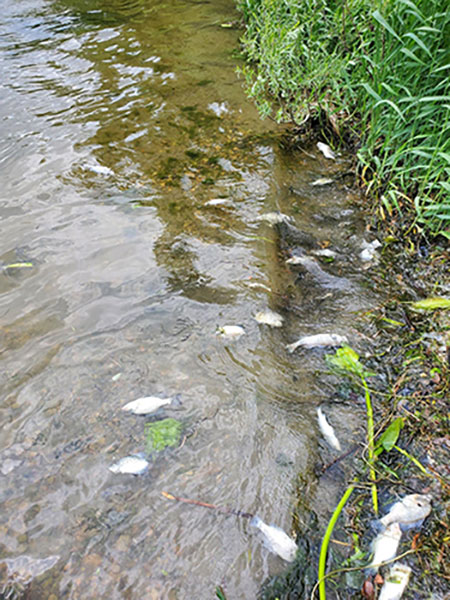MDNR Report
 Fish Kill
Fish Kill
With increasing temperatures across Michigan, anglers, boaters and lakefront property owners may discover dead fish or other aquatic animals. While such sights can be startling, the Michigan DNR reminds everyone that it is common — summer heat conditions can cause fish and other creatures such as turtles, frogs, toads and crayfish to die.
“The majority of summer fish kills are due to low oxygen in the water, a natural phenomenon associated with weather,” said Jeremiah Blaauw, DNR fisheries biologist. “However, some other factors such as chemical treatments of aquatic plants and algae can increase the risk of a fish kill.”
Environmental conditions strongly affect the stress level of fish; temperature and dissolved oxygen concentrations are key variables. Fish need oxygen just as humans do, but fish absorb dissolved oxygen (oxygen gas that is dissolved in water) directly through their gills into the bloodstream.
During periods of hot, calm weather, dissolved levels of oxygen in nutrient-rich lakes often decline, while the metabolic rate in most fish — the number of calories needed to accomplish basic life-sustaining functions like respiration — increases. That means fish in these systems often are being pinched by both temperature and oxygen at the same time.
"'Nutrient-rich' sounds like a good thing, but that isn't necessarily true when it comes to water quality," Blaauw said. “Our lakes often have artificially high concentrations of nutrients due to human-connected sources like wastewater or fertilizer runoff. The nutrients support dense growth of plants and algae. While plants and algae produce oxygen during the day through photosynthesis, they consume oxygen at night via their own respiration. This situation can lead to oxygen crashes during warm summer nights.”
Spawning stress is another factor that plays a critical role in many fish mortality events. Due to the wide variations in climate from north to south in Michigan, sunfish can spawn from May through early July. During the last five years, these three months had the highest numbers of fish kill reports through the DNR's Eyes in the Field system.
Most fish kill events are the culmination of a series of causes. For example, the following scenario occurs every year in southern Michigan. Bluegills are stressed from spawning activity. At the same time, a period of hot weather causes water temperatures to rise rapidly. Herbicide is applied to control algae and invasive plant species. This combination of stressors depresses the immune system, and bacteria already present in the lake infect bluegills and result in an outbreak of columnaris disease.
Learn more about fish kills at Michigan.gov/FishHealth.
The public is welcome to report fish kills using the Eyes in the Field website; such reports are valuable to the DNR’s ability to manage the state’s aquatic resources. If you suspect a fish kill is due to nonnatural causes, call the nearest DNR office or Michigan's Pollution Emergency Alert System at 800-292-4706.


